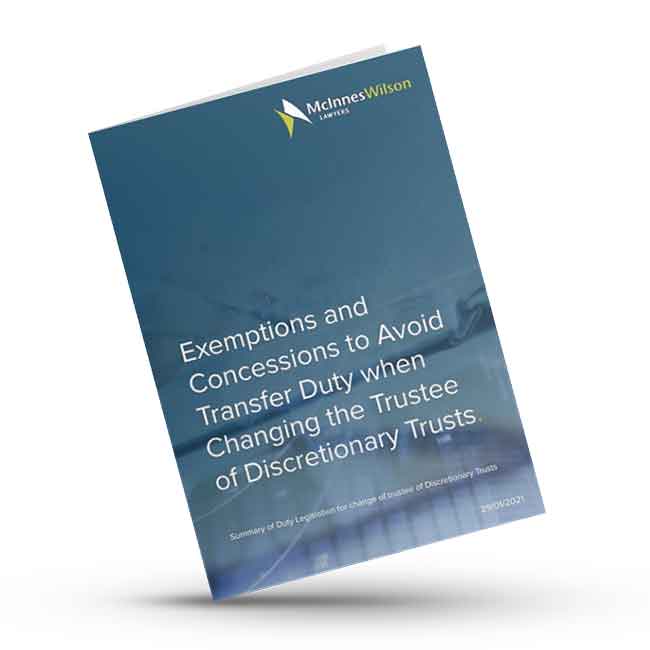Clients wishing to replace the trustee of a discretionary trust should be aware that it is not always as easy as it seems. Generally, it seems like a straightforward process, however, there are some key issues to think about to avoid unintended and some disastrous results.
DOES THE TRUST DEED ALLOW FOR A CHANGE OF TRUSTEE?
This is the first step in determining whether a change of trustee can occur. It is occasionally overlooked as most modern trust deeds contain straightforward provisions that allow for changes of trustees. However, older trust deeds may not contain such straightforward and easy-to-follow provisions.
If considering a change of trustee, it is imperative that the trust deed is reviewed to check if a change of trustee is allowed and the process for the change of trustee.
If the trust deed does not allow for a change of trustee, it may be necessary to follow the process set out in the Trusts Act 1973 (Qld) (or equivalent provision in other states and territories) or apply to the court for an order allowing the change. These options are not always suitable.
Also, the change of trustee process under older trust deeds can be prohibitive (e.g. requiring the consent of a settlor who may not be alive) and can mean that a court order may be necessary to achieve the goal of changing the trustee.
INDIVIDUAL TRUSTEE V CORPORATE TRUSTEE
Subject to confirming the change of trustee provisions in the trust deed, the trustee and beneficiaries should consider whether they wish to appoint a new individual as a trustee, or whether they wish to appoint a corporate trustee.
Appointing a corporate trustee has benefits as corporations enjoy limited liability, meaning that if the trust falls into legal or financial difficulties and there is not enough cash or assets in the trust to satisfy any losses of claims, the corporate trustee will only be liable to the extent of the company’s assets.
An individual trustee in this situation exposes their assets to satisfying losses and claims against the trustee.
DEED OF RETIREMENT AND APPOINTMENT OF A TRUSTEE
Once it has been established that the trust deed allows for a change of trustee, effecting the change is usually undertaken by way of a deed of retirement of the current trustee and appointment of the new trustee.
Drafters should be careful to ensure that they are referring to the correct provisions of the trust deed that provide for the power of appointment and retirement of the trustee.
They should also ensure that all parties who are required to consent or be provided with notice of the change of trustee are either included as parties to the deed or provided with separate notice following the change (for which records should be kept to evidence the notice requirement being satisfied).
COMPLIANCE WITH THE TRUSTS ACT 1973 (QLD)
Section 12(2)(c) of the Trusts Act 1973 (Qld) sets out requirements for the number of trustees of a trust and provides that a retiring trustee will not be discharged from their duties as a trustee in certain circumstances. The circumstances which most often arise is where there were originally 2 or more trustees appointed to the trust.
More recent trust deed drafting will contain provisions that deal with the requirements of section 12(2)(c), however, this is an issue that people should be aware of and check the trust deed for, when changing trustees.
DUTY CONSEQUENCES
Transfer or stamp duty may be imposed on transactions that result in the transfer of “dutiable property”. In Queensland “dutiable property” includes business assets, as well as rights and interests in land.
When the trustee of a discretionary trust retires or is removed, the legal interest in the trust property is transferred to new or continuing trustees. The transfer of the legal interest in trust property ordinarily gives rise to a dutiable transaction and would, in the absence of any exemption, give rise to a transfer or stamp duty liability.
There are concessions or full exemptions to duty in each state and territory where dutiable property has been transferred to a new or continuing trustee as a result of a retirement or removal of a trustee of a discretionary trust.
However, with differing laws in each state and territory, care needs to be taken in determining whether the circumstances would satisfy the requirements of the concession or exemption. Refer to our free downloadable PDF that summarises the position in the various states and territories around Australia.
Additionally, if parties are appointing a corporation as the trustee of the discretionary trust, they should be aware that a change in ownership of the shares in the corporate trustee may give rise to corporate trustee duty.
On top of this, additional foreign acquirer duty can apply in relation to transactions to which corporate trustee duty applies.
STATUTORY DECLARATIONS
If you are changing the trustee of a trust that has dutiable property in Queensland, you should be aware that the Queensland Office of State Revenue requires that a “Statutory Declaration: Change of trustee” is completed. There are two versions:
- Where there is no change in the rights or interest of a beneficiary of a trust; or
- Where there is a change in the rights or interest of a beneficiary of a trust.
Completing these declarations is sometimes overlooked, but they are part of the duty records that need to be kept in relation to the change of trustee.
HOW CAN WE HELP YOU?
McInnes Wilson Lawyers can help you by:
- advising on the ability to change a trustee;
- drafting documents evidencing the change of trustee;
- drafting the necessary resolutions, resignations statutory declarations and other forms required by relevant state or territory revenue authority;
- attending to lodgement and notifications with the relevant government authorities; and
- advising on transfer duty and corporate trustee duty obligations.
If you require assistance or any further information please contact Taryn Hartley.
Principal

